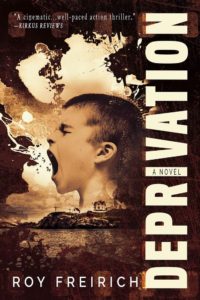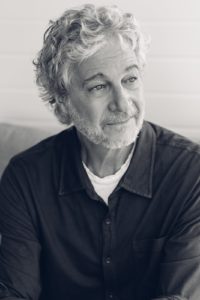FOR IMMEDIATE RELEASE
Author follows up impressive debut novel and film adaptation featuring all-star cast
MALIBU, California – An accomplished author, screenwriter, and lyricist, Roy Freirich adapted his celebrated debut novel, “Winged Creatures” into the feature film “Fragments,” with Forest Whitaker, Jennifer Hudson, and Dakota Fanning among an all-star cast. He’s written screenplays for Fox Searchlight, Dreamworks, Warner Brothers, and Sony. His lyrics have been sung by Aretha Franklin, Smokey Robinson, and Patti Labelle. And now he’s releasing a new speculative psychological thriller, “Deprivation” (Meerkat Press, March 3, 2020).
Struggling with insomnia, Freirich was haunted by a terrifying question: What if we’re unable to ever sleep again? Those sleepless nights catalyzed “Deprivation,” hailed by Kirkus as “cinematic” and a “well-paced action thriller” that will “shake readers awake.”
August, Carratuck Island, New York: A silent child is found abandoned on the beach clutching a handheld video game, and residents and tourists alike are stricken with relentless insomnia. Denied the outlet of dreams — fears, guilt and primal urges find other ways to surface. Delusions deepen into hysteria as the island becomes cut off from the mainland, plunging into mob rule, murder, and suicide.
Freirich’s first novel, “Winged Creatures,” was hailed by Publisher’s Weekly as a “stark, impressive debut,” and Booklist said, “This well-crafted debut packs a wallop.” Now his newest page-turner, “Deprivation,” will certainly ensure readers are in for a sleepless night.
ABOUT THE BOOK

“Deprivation”
Roy Freirich
March 3, 2020
Meerkat Press
Psychological Thriller
Paperback
978-1946154217
$17.95
 ROY FREIRICH leads multiple lives as a writer — of lyrics, movies, and novels. His lyrics have been sung by legends Aretha Franklin, Smokey Robinson, and Patti Labelle, among many others. He’s written screenplays for Fox Searchlight, Dreamworks, Warner Brothers, and Sony, and adapted his novel, “Winged Creatures,” for the film, “Fragments,” featuring Forest Whitaker, Dakota Fanning, Guy Pearce, Josh Hutcherson, and Kate Beckinsale. He has also served as editor for the national desk of The New York Times and for the renowned Beloit Poetry Journal. He lives with his wife, ever-patient editor, and frequent co-writer, Debrah, in Malibu, California. Together, they’ve written the libretto for a musical adaptation of Anne Rice’s “Cry to Heaven,” for Seattle’s 5th Avenue Theatre. Visit him online at www.royfreirich.com.
ROY FREIRICH leads multiple lives as a writer — of lyrics, movies, and novels. His lyrics have been sung by legends Aretha Franklin, Smokey Robinson, and Patti Labelle, among many others. He’s written screenplays for Fox Searchlight, Dreamworks, Warner Brothers, and Sony, and adapted his novel, “Winged Creatures,” for the film, “Fragments,” featuring Forest Whitaker, Dakota Fanning, Guy Pearce, Josh Hutcherson, and Kate Beckinsale. He has also served as editor for the national desk of The New York Times and for the renowned Beloit Poetry Journal. He lives with his wife, ever-patient editor, and frequent co-writer, Debrah, in Malibu, California. Together, they’ve written the libretto for a musical adaptation of Anne Rice’s “Cry to Heaven,” for Seattle’s 5th Avenue Theatre. Visit him online at www.royfreirich.com.
In an interview, Roy Freirich can discuss:
*How his personal experiences with insomnia influenced his new novel
*The benefits and unique challenges of creative versatility, as Freirich finds success as a screenwriter, novelist, poet and lyricist
*The experience of adapting his hit debut novel “Winged Creatures” into the feature film “Fragments” starring Dakota Fanning and Forest Whitaker
*How sleep deprivation impairs one’s sense of reality and judgment, while increasing stress, fear, depression, and primal urges
*His mission to create an online community for people suffering from insomnia and sleep deprivation
An Interview with ROY FREIRICH
Is there any sort of common theme in your work?
In retrospect, yes: we’ve all had unresolved experiences, from unfulfilled wishes, desires for a “do-over,” or l’esprit d’escalier, from small regrets to more serious trauma from violence, catastrophe, death. How do we unknowingly reenact these in our lives and in our dreams, in disguised or symbolic forms? How do unresolved experiences in the past inform our choices in the present?
“Winged Creatures” follows a few survivors of a traumatic mass shooting: a doctor who fails to save victims refuses to allow dying patients to die; a man whom a bullet narrowly missed thinks he’ll be lucky at casinos, too. A girl who survived fixates on birds like the ones she saw out the window where the horrific shooting occurred.
“Deprivation” focuses on re-enactment, as well, but in dreams, where we replay versions of unresolved experience more safely, variously disguised or symbolized, as a way to process and work through them. It’s vital to our emotional stability. As we lose more and more sleep, we lose the emotional stability that dreams help us maintain, and each of our unique preoccupations, desires, misconceptions and fears can spiral into obsessions, urges, delusions and paranoia. Multiply by an entire town cut off from the world for weeks where no one can sleep and you have anarchy, chaos, mob rule, violence: the novel “Deprivation.”
A common inspiration for both, if not for everything: Judith Herman’s perspicacious and compassionate “Trauma and Recovery, and “Fearless” by Raphael Iglesias — both a study of the unconscious urge to re-enact trauma.
How did your own struggles with insomnia inspire the novel?
It started with screeching tires and car horns — I was making a left through a red light across three lanes of oncoming traffic, suffering from what I learned was a micro-sleep, from having missed just two hours of sleep the night before. Just a small example of the diminished capacity we suffer from deprivation. Add the decrease in emotional stability, and eventually — depending on how long without sleep — delusions, hysteria, hallucinations. Multiply by an entire town cut off from the world for weeks, and you have the chaos of the novel.
People suffer insomnia late at night, alone. How can they feel less alone?
I’ve been posting some of my own experiences on my website and social media, and I’d love to see people post their own stories and struggles. The internet is a funny thing — it makes us more alone, sometimes, but it can also be a way to find a connection and community … Am I the only trying to find the perfect sleep mask? Who else wonders if the far-off barking dog is the same one from the other night?
You’ve been a songwriter with songs recorded by Aretha Franklin, Patti Labelle, Smokey Robinson and others. And a screenwriter, too, with Oscar-winning actors in your own film adaptation of your first novel, “Winged Creatures.” Which medium do your prefer?
Right now, it’s certainly novels. So much more indulgent navel-gazing permitted; all the information in screenplays is external action, more immediately plot-driven. It’s a broad generalization I’ll probably regret 10 minutes from now. I’ll probably dream about being wrong in public in some disguised form, I’m sure.
Any specific inspirations for your fiction?
There’s spite, definitely — to spite the naysayers in my life. And envy, always — of my first literary crushes as an English major, who were really poets. I desperately, childishly yearned to possess some infinitesimal fraction of their ability to express so definitively. The Moderns, first, then going back through the eras, Victorian, Romantic, weaker on the Restoration, progressively weaker going back, I admit, and then I fell hard for Greek Language and Lit despite my absurdly challenged ability to translate. In Greek class I hid behind a tall woman with enormous hair so I wouldn’t be called on to sight-read. But it didn’t keep me from envying the emotional wisdom and authenticity of the Tragedians, Homer, Hesiod, the lyric fragments that survive. So, yes, through poetry, I gained a sense of how a wrought sentence fires on all cylinders —figurative, literal, connotational, denotational, rhythm and music. And also from Greek studies – Aristotle, whose Poetics taught me about the demands of story, certainly required reading for screenwriters.
Any specific inspirations for “Deprivation”?
I have to credit my own issues with sleep loss. My first wake-up call was the screech of tires and blare of horns as I attempted a left through a red light across three lanes of oncoming traffic. I later understood it to be a micro-sleep, due to just two hours of missed sleep the night before.
Then came the realization of diminished capacity from deprivation in other areas of my life, from working for too many hours for seriously diminishing returns. If I write a crap sentence or scene or song lyric, we all live to tell, but what about doctors, pilots, Presidents?
And, yes, I might be a little more emotionally unpredictable when sleep deprived: I’m not saying completely ranting paranoid stress ball crybaby, except maybe for that one time, or the other, but without sleep I’m not quite as utterly serene as usual.
Film adaptation of “Deprivation”?
Absolutely. I think this one lends itself to a film adaptation.
What’s next for you?
Aside from continuously beating the drum for my screenplays, I have a new novel I’m close to finishing. It’s best not to say too much — but there’s the key dramatic unity again — of a few very different characters united by a similar experience (here a clinical trial for an antidepressant that may or may not work, or make them worse) that forces them to make peace with their unresolved if not traumatic pasts. This one, titled “Bright Noise,” doesn’t judge the separate peace each attains — via delusions, domination, repression, or otherwise twisted strategies. If we think we’re happy, who’s to say we’re not? So there’s my attempt at purposely being vague and intriguing for the moment.

A former award-winning journalist with national exposure, Marissa now oversees the day-to-day operation of the Books Forward author branding and book marketing firm, along with our indie publishing support sister company Books Fluent.
Born and bred in Louisiana, currently living in New Orleans, she has lived and developed a strong base for our company and authors in Chicago and Nashville. Her journalism work has appeared in USA Today, National Geographic and other major publications. She is now interviewed by media on best practices for book marketing.
